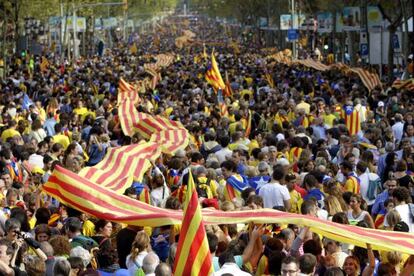Hundreds of thousands form human chain for Catalan independence
“La Via Catalana” crosses region from north to south as part of Diada national day celebrations Premier Mas commits to negotiating with Rajoy “until the end” over sovereignty vote

Hundreds of thousands of people joined hands to form a human chain across Catalonia in a massive show of support for the independence movement as the region celebrated its national day on Wednesday.
Organized by Catalonia’s National Assembly (ANC) political organization at 5.14pm, “La Via Catalana” was the centerpiece of the events marking this year’s Diada, which comes amid intense debate between Catalan leaders and the central Madrid government over the northwest region’s right to hold a referendum on sovereignty.
Around 400,000 people officially signed up to take part in the chain, according to the ANC, which said the real number of participants was much higher given that the chain comprised several rows on many stretches of the route.
“La Via Catalana for independence has been an unprecedented success,” said ANC president Carme Forcadell afterwards. “We want a state, to which we have the right. […] Today we showed it to the world.
“We want it now, not in 2016,” she added, referring to the hint made by regional premier Artur Mas last week that plebiscite-style elections might be held in 2016 if the referendum is not allowed to be held next year.
“We want 2014 to become the first year of our liberty,” she concluded to a huge ovation in Barcelona’s Plaça Catalunya where many had gathered after the chain.
The human chain spanned the whole of the region, stretching along the coast from the French border in the north to the south of Tarragona, a distance of around 400 kilometers. The initiative was inspired by the 600-kilometer-long chain formed by citizens of Estonia, Latvia and Lithuania to demand their independence from the Soviet Union in 1989.
Mas — who did not participate in the Via himself in order to “preserve” the institution, though many leading members of his CiU Catalan nationalist bloc did — used the run-up to the chain to repeat his call for dialogue with Prime Minister Mariano Rajoy’s government over a proposed independence vote. Mas said he would negotiate with the Popular Party leader “until the end” to obtain the referendum. At the same time, he also warned that the Spanish state would have “a serious problem of relations with Catalonia” if it did not find a way to channel Catalan anxieties over deciding its future.
In a brief press conference after the institutional Diada del Onze de Setembre ceremony, Mas said he was convinced that the human chain for independence would serve to launch an unequivocal message to the outside world that Catalans want to “exercise their right to decide.”
Alternative ceremony
For the first time in its history the Popular Party (PP) held an alternative to the official Diada ceremony, which is organized by the regional government each year in the Parc de la Ciutadella. Around 200 PP supporters gathered in the symbolic Plaça del Rei, where the Catholic Monarchs, Ferdinand and Isabella, received Christopher Columbus after his arrival from his first voyage to the Americas. “From this place, from Barcelona, the first monarchs of Spain, the Catholic Monarchs, learned of the existence of America and Spain knew it would be the greatest nation in the world,” said Catalan PP leader Alicia Sánchez-Camacho.
The senator told Mas not to use the Diada as a world showcase for the independence drive and criticized him for equating the human chain with the march for civil rights led by Martin Luther King in the United States in 1963. “It is not necessary for Mas to pledge to pass into history. He is not going to be a great statesman. His only legacy is going to be one of division. Mas distinguishes between the first-class Catalans and the second-class ones, the bad ones. And that does not make a good president,” she said.
Tu suscripción se está usando en otro dispositivo
¿Quieres añadir otro usuario a tu suscripción?
Si continúas leyendo en este dispositivo, no se podrá leer en el otro.
FlechaTu suscripción se está usando en otro dispositivo y solo puedes acceder a EL PAÍS desde un dispositivo a la vez.
Si quieres compartir tu cuenta, cambia tu suscripción a la modalidad Premium, así podrás añadir otro usuario. Cada uno accederá con su propia cuenta de email, lo que os permitirá personalizar vuestra experiencia en EL PAÍS.
En el caso de no saber quién está usando tu cuenta, te recomendamos cambiar tu contraseña aquí.
Si decides continuar compartiendo tu cuenta, este mensaje se mostrará en tu dispositivo y en el de la otra persona que está usando tu cuenta de forma indefinida, afectando a tu experiencia de lectura. Puedes consultar aquí los términos y condiciones de la suscripción digital.








































